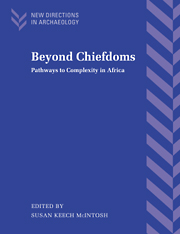Book contents
- Frontmatter
- Contents
- List of figures
- List of tables
- List of contributors
- Preface
- 1 Pathways to complexity: an African perspective
- 2 The segmentary state and the ritual phase in political economy
- 3 Perceiving variability in time and space: the evolutionary mapping of African societies
- 4 Western representations of urbanism and invisible African towns
- 5 Modeling political organization in large-scale settlement clusters: a case study from the Inland Niger Delta
- 6 Sacred centers and urbanization in West Central Africa
- 7 Permutations in patrimonialism and populism: The Aghem chiefdoms of Western Cameroon
- 8 Wonderful society: the Burgess Shale creatures, Mandara polities, and the nature of prehistory
- 9 Material culture and the dialectics of identity in the Kalahari: AD 700–1700
- 10 Seeking and keeping power in Bunyoro-Kitara, Uganda
- 11 The (in)visible roots of Bunyoro-Kitara and Buganda in the Lakes region: AD 800–1300
- 12 The power of symbols and the symbols of power through time: probing the Luba past
- 13 Pathways of political development in equatorial Africa and neo-evolutionary theory
- Index
13 - Pathways of political development in equatorial Africa and neo-evolutionary theory
Published online by Cambridge University Press: 14 October 2009
- Frontmatter
- Contents
- List of figures
- List of tables
- List of contributors
- Preface
- 1 Pathways to complexity: an African perspective
- 2 The segmentary state and the ritual phase in political economy
- 3 Perceiving variability in time and space: the evolutionary mapping of African societies
- 4 Western representations of urbanism and invisible African towns
- 5 Modeling political organization in large-scale settlement clusters: a case study from the Inland Niger Delta
- 6 Sacred centers and urbanization in West Central Africa
- 7 Permutations in patrimonialism and populism: The Aghem chiefdoms of Western Cameroon
- 8 Wonderful society: the Burgess Shale creatures, Mandara polities, and the nature of prehistory
- 9 Material culture and the dialectics of identity in the Kalahari: AD 700–1700
- 10 Seeking and keeping power in Bunyoro-Kitara, Uganda
- 11 The (in)visible roots of Bunyoro-Kitara and Buganda in the Lakes region: AD 800–1300
- 12 The power of symbols and the symbols of power through time: probing the Luba past
- 13 Pathways of political development in equatorial Africa and neo-evolutionary theory
- Index
Summary
The main evolution of societies in the standard neo-evolutionary sequence is seen as a progression from quite small-scale totally autonomous groups called “bands” towards very large-scale and highly centralized social formations called “states” through still ill-defined intermediary stages labeled “tribe” and “chiefdom.” The whole progression then is defined in terms of political organisation (Yoffee 1993). It is in this context that the long-term history of political organisations in Equatorial Africa (Figure 13.1), described in a recent study (Vansina 1990), is relevant to test the theory. Equatorial Africa designates the northern part of Central Africa – an area as large as the United States east of the Mississippi, mostly covered by various tropical rainforests. Anthropologists have recognized some 450 ethnic groups there, and it is possible to distinguish about twenty-five different political regimes in the area (using the distinctions common in social anthropology and disregarding a special “band” status for foragers such as pygmies since these constituted only a part of a society, the other part being that of their farmer hosts). These political institutions are based on the most diverse ideological principles and range in size from single villages, such as Libinza (Ngiri area, Zaire) comprising as few as a hundred or so inhabitants, to kingdoms encompassing well over 100,000 inhabitants. If one includes the kingdom of Kongo in its centuries-long heyday, there was even a polity of 500,000 people. The range includes the “tribe,” “chiefdom,” and “state” rungs on the neo-evolutionary ladder. In addition, equatorial Africa is especially interesting because all these political regimes developed out of a single ancestral political system, existing 5,000 years ago. Moreover, they did so largely in isolation from the outside world.
- Type
- Chapter
- Information
- Beyond ChiefdomsPathways to Complexity in Africa, pp. 166 - 172Publisher: Cambridge University PressPrint publication year: 1999
- 15
- Cited by



